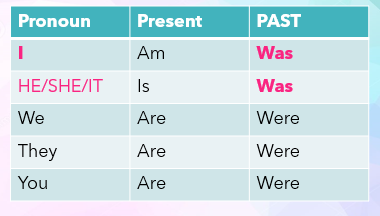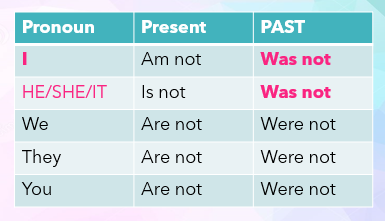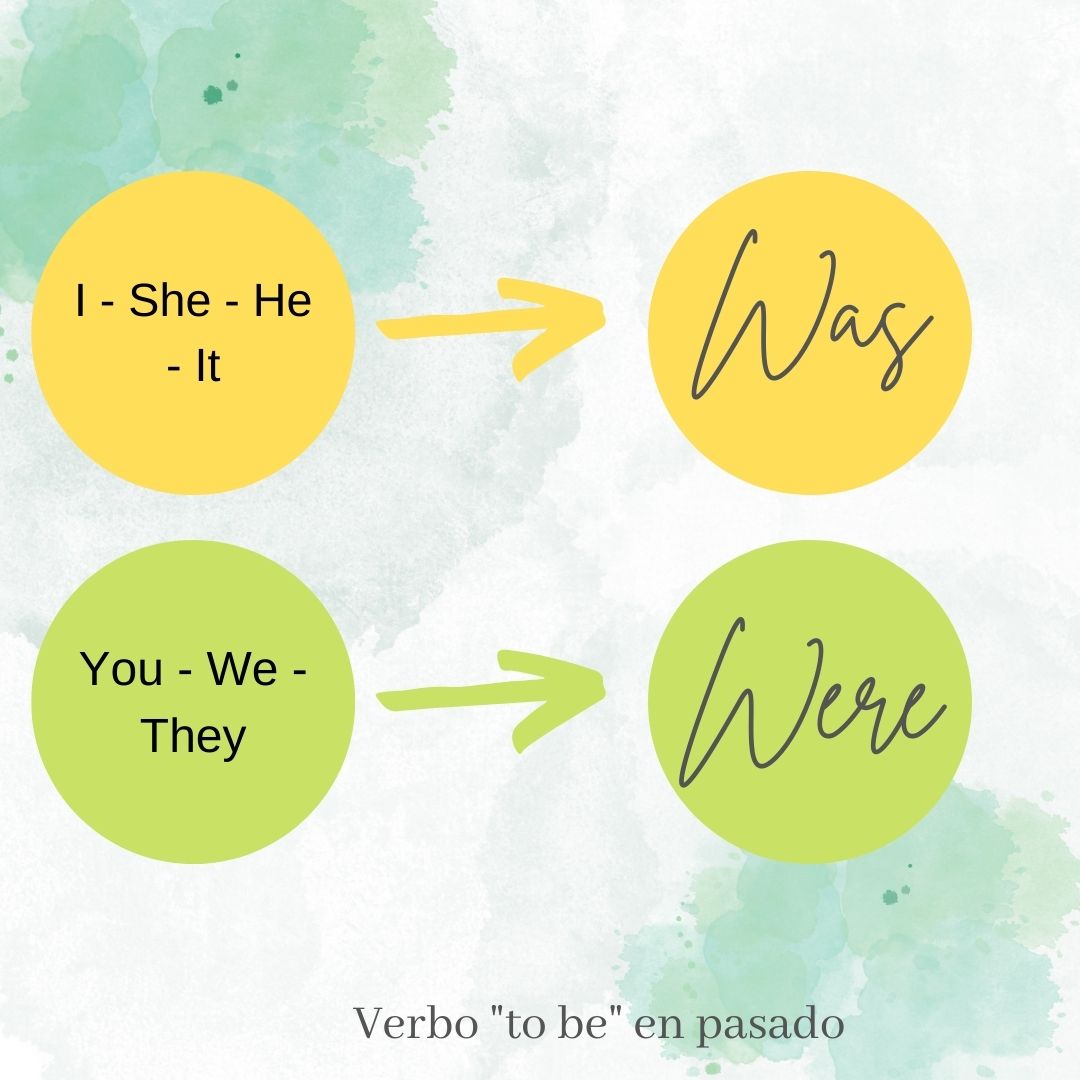¿Cómo se dice "to be" en pasado simple en inglés?
Hoy aprenderemos el pasado de "verb to be".
La conjugación:
Comencemos con la conjugación, utilizaremos WAS para las personas singulares: I, HE, SHE e IT.
Y usaremos WERE para los plurales: WE, THEY, YOU.
Te dejo una tabla acá abajo:

Nota: SÓLO usamos un verbo "to be" junto a otro verbo cuando es un tiempo progresivo.
Estructuras.
Affirmative: ☻ + WAS/WERE + ... (complement)
She WAS always really happy <- adjective
Ella siempre ESTABA feliz <- adjetivo
I failed my exam so I WAS sad <- emotion
Reprobé mi examen así que ESTABA triste <- emoción
Matthew WAS an excelent pianist at age 4. Adjective
Mateo ERA un pianista excelente a los 4 años <- adjetivo
That man WAS my father <- state of being
Ese hombre ERA mi papá <- título de parentesco

Negative: ☻ + WAS/WERE + NOT + ... (complement)
She WAS NOT my sister, WAS my cousin.
Ella no ERA mi hermana, ERA mi prima.
We WERE NOT at home.
No ESTÁBAMOS en casa.
Question: WAS/WERE + ☻ + ... (complement) ?
WERE you at home? <- place
¿ESTABAS en casa? <- lugar
WAS Matthew tall? <- adjective
¿Mateo ERA alto? <- adjetivo
WERE you hungry? <-mood
¿ESTABAS hambriento? <-emoción
Ahora sabes la conjugación de "be" en pasado y cómo usarlo ♥
Te dejo unos ejercicios abajo:
Yesterday I went to the cinema, the movie WAS / WERE horrible!
When we WAS / WERE children, we couldn´t talk properly.
I remember my prom dress, it WAS / WERE red and shiny.
They WAS / WERE friends for many years.
Yesterday morning WAS NOT / WERE NOT as cold as other days.
-------------------------------------------------------------------------------------------
Te dejo las respuestas acá abajo:
Yesterday I went to the cinema, the movie WAS horrible!
When we WERE children, we couldn´t talk properly.
I remember my prom dress, it WAS red and shiny.
They WERE friends for many years.
Yesterday morning WAS NOT as cold as other days.
Sigamos aprendiendo ♥


Verb "to be" en pasado
Para este verbo, en pasado, usaremos dos formas:

*Recuerda que este verbo se usa para hablar de: estados de ánimo, adjetivos, estar de lugar, miembros de la familia
¡Veamos algunos ejemplos!
Estados de ánimo: She was sad (ella estaba triste)
Adjetivos: My friend was so adorable, he stayed with me all the time (Mi amigo fué tan adorable, el se quedó conmigo todo el tiempo)
Lugares: We were at the beach when you called (Nosotros estabámos en la playa cuando usted llamó)
Miembros de la familia: My parents were doctors for 20 years (Mis padres fueron doctores por 20 años)
¡Practiquemos!
Usa la forma correcta del verbo "to be" en cada enunciado:
They ____ (was/were) at the hospital all night
You ____ (was/were) such a great doctor
I ____ (was/were) very shy when I ____ (was/were) young
He ____ (was/were) the best student
¡Aprende más en mis clases! 🌟🌟
¡Nos vemos allá!
be en pasado simple se dice 'was/were'
be tiene 3 formas en presente simple: am, is, are
en pasado, se convierten en solo 2 formas: was, were
se usa was para: I, he, she, it :
I was sick yesterday.
Tom was in Paris last week.
se usa were para: you, we, they :
The people were in the hospital for five hours yesterday.
Were you in my class in primary school? I think I remember you.
explicado de otra forma:
am / is se convierten en was en pasado
are se convierte en were en pasado
Ejemplos:
Today, Mark is sick. He was sick yesterday, too.
I'm tired today, because yesterday I was in the gym all day.
You were in my class last year and you are in my class this year. Cool!
The tigers are in the zoo now, but 6 months ago, they were in the jungle.
Recuerda:
Presente: is --> Pasado: was
Presente: are --> Pasado: were
¡Así de fácil!



